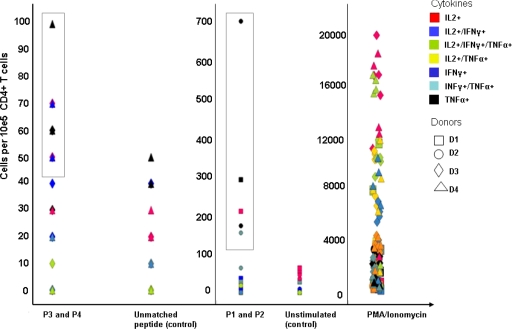FIG. 7.
MHC class II-restricted expansion of peptide-specific CD4+ T cells. PBMCs from HIV-negative and MHC class II-genotyped blood donors were stimulated with the following peptides: for donors 1 to 3, peptides SLYVTVATLYCVHQRIEV and FRKQNPDIVIYQYMDDLYVG, representing HIV Gag (amino acids 77 to 94) and HIV reverse transcriptase (amino acids 171 to 190), respectively (peptides 1 and 2 [P1 and P2]). PBMCs from donor 4 were stimulated with ALFYKLDVVPINDNTSYRL from HIV gp160 (amino acids 174 to 193) and EKLWVTVYYGVPVWKEATTT from HIV gp160 (amino acids 32 to 51) (peptides 3 and 4 [P3 and P4]). After three rounds of peptide stimulation, PBMCs were tested for peptide-specific reactivity defined by intracellular production of TNF-α, IFN-γ, and IL-2 in intracellular cytokine staining. Phorbol myristate acetate/ionomycin served as the positive control; negative controls included the incubation in medium or stimulation with an irrelevant HIV peptide which was not used for stimulation (EKLWVTVYYGVPVWKEATTT for donors 1 to 3 and peptide FRKQNPDIVIYQYMDDLYVG for donor 4). Results are reported as absolute numbers of cytokine-producing cells/105 CD4+ T cells.

